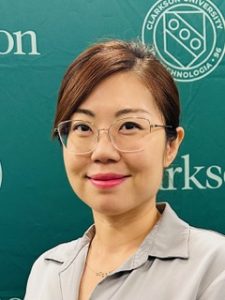 Taking a closer look at research and experiences of SSHD members
Taking a closer look at research and experiences of SSHD members
~Researcher’s Window~
This month, we are getting better acquainted with the research of Dr. Ying Zhang, Assistant Professor of Psychology at Clarkson University and an emerging scholar committee member of SSHD.
- What drew you to do work in human development?
Growing up in a diverse neighborhood, I was intrigued by the varied paths my peers took, shaped by their environments. This sparked my interest in human development, leading me to pursue a master’s in clinical psychology at Jilin University, China. There, I learned the importance of early preventative mechanisms in family settings, which can have a profound impact on development. My doctoral studies at Syracuse University further honed my focus on child development, especially on the effects of experiences like intimate partner violence, maternal mental health, and parenting on children’s growth. This journey deepened my commitment to understanding and improving the foundational experiences that shape human development.
2. Did you have any mentor or a researcher who had a substantial influence on your path or work?
I've been very fortunate to have many great mentors who aren't just brilliant but also incredibly supportive. At Syracuse University, Dr. Rachel Razza, my doctoral advisor, was one of those people. She not only supports my research focus towards early childhood experiences and self-regulation but also brought me into exciting research projects on how mindfulness can enhance self-regulation. Rachel’s warmth, compassion, and the way she balances guidance with autonomy have set an example, which I carry with me in my own teaching and mentoring. Now at Clarkson University, I have received the support of Dr. Lisa Legault in the Psychology Department. Her unwavering support and guidance have been key in helping me navigate the path to tenure while keeping a productive yet balanced career. I’m grateful to have her in my corner.
3. Key contributions to human development:
My research is rooted in Diversity Science and driven by a deep commitment to improving the well-being of children and families through empirical studies. I focus on understanding how different contextual factors—such as intimate partner violence (IPV), parental mental health, and socioeconomic disparities—shape self-regulation in children. At its core, my work seeks to identify key mechanisms of risk and resilience, particularly in early life and adolescence, to inform more effective interventions.
One of my main research areas explores how IPV exposure affects children's self-regulation and overall development. My recent work (Zhang et al., 2024; Family Process) examines how parenting stress and warmth mediate the relationship between IPV exposure and self-regulation, emphasizing the critical role of caregiving environments. A key contribution of my work is synthesizing these findings across developmental stages. For example, a three-wave cross-lagged study (Zhang et al., 2023, Child Abuse & Neglect) provides evidence that IPV and child maltreatment often co-occur and jointly shape self-regulation trajectories over time. Additionally, my systematic review (Zhang et al., 2023, Journal of Family Violence) consolidates decades of research, identifying critical gaps and future directions for understanding the long-term effects of IPV on children's development.
Building on these work, my recent HHS-funded project, Maximizing the Impact of Early Head Start Programs, extends these investigations by taking a person-centered approach to understanding how varying levels of early Head Start program engagement influence children's emotional regulation, parenting practices, and maternal mental health. Using latent growth modeling, our team aims to identify the most effective service profiles for different families, refining early intervention strategies to better support child and family well-being.
4. Your one wish for the study of human development
If granted one wish, it would be for greater recognition and adoption of advanced computational methods, like machine learning, in human development research. These tools could transform our ability to predict outcomes and design personalized interventions. By integrating them, we could better understand the complex interactions between genetic, environmental, and psychological factors across the lifespan, advancing both research and real-world applications in human development.
5. A mentoring statement or quote
“Somewhere, something incredible is waiting to be known.” – Carl Sagan
About the researcher Dr. Ying Zhang is an assistant professor of psychology at Clarkson University, her research focuses on contextual factors such as violence exposure, poverty, maternal mental health, and parenting influencing childhood self-regulation. She also studies topics on appreciation of diversity-seeking, and wellbeing. Dr. Zhang's expertise lies in analyzing longitudinal data with advanced statistical modeling (e.g., latent profile analyses, longitudinal path analysis, latent growth modeling, cross-lagged modeling, and multi-level modeling). She recently developed and taught two undergraduate courses, "Diversity Science" and "Cultural Psychology," focusing on promoting prejudice reduction and cultural competence in college students. She received M.Ed. in Applied Psychology (Clinical track) in China and a Ph.D. in Human Development and Family Science from Syracuse University.
Dr. Ying Zhang is an assistant professor of psychology at Clarkson University, her research focuses on contextual factors such as violence exposure, poverty, maternal mental health, and parenting influencing childhood self-regulation. She also studies topics on appreciation of diversity-seeking, and wellbeing. Dr. Zhang's expertise lies in analyzing longitudinal data with advanced statistical modeling (e.g., latent profile analyses, longitudinal path analysis, latent growth modeling, cross-lagged modeling, and multi-level modeling). She recently developed and taught two undergraduate courses, "Diversity Science" and "Cultural Psychology," focusing on promoting prejudice reduction and cultural competence in college students. She received M.Ed. in Applied Psychology (Clinical track) in China and a Ph.D. in Human Development and Family Science from Syracuse University.
Edited and launched by Yoko Yamamoto, Deborah J. Johnson, and Qingyang Liu
SSHD Publicity & Diversity Science Initiative Committee
Visit our website for more information! https://sshdonline.org/
Like us on Facebook!
Follow us on Instagram!
Follow us on LinkedIn!

 Dr. Ying Zhang is an assistant professor of psychology at Clarkson University, her research focuses on contextual factors such as violence exposure, poverty, maternal mental health, and parenting influencing childhood self-regulation. She also studies topics on appreciation of diversity-seeking, and wellbeing. Dr. Zhang's expertise lies in analyzing longitudinal data with advanced statistical modeling (e.g., latent profile analyses, longitudinal path analysis, latent growth modeling, cross-lagged modeling, and multi-level modeling). She recently developed and taught two undergraduate courses, "Diversity Science" and "Cultural Psychology," focusing on promoting prejudice reduction and cultural competence in college students. She received M.Ed. in Applied Psychology (Clinical track) in China and a Ph.D. in Human Development and Family Science from Syracuse University.
Dr. Ying Zhang is an assistant professor of psychology at Clarkson University, her research focuses on contextual factors such as violence exposure, poverty, maternal mental health, and parenting influencing childhood self-regulation. She also studies topics on appreciation of diversity-seeking, and wellbeing. Dr. Zhang's expertise lies in analyzing longitudinal data with advanced statistical modeling (e.g., latent profile analyses, longitudinal path analysis, latent growth modeling, cross-lagged modeling, and multi-level modeling). She recently developed and taught two undergraduate courses, "Diversity Science" and "Cultural Psychology," focusing on promoting prejudice reduction and cultural competence in college students. She received M.Ed. in Applied Psychology (Clinical track) in China and a Ph.D. in Human Development and Family Science from Syracuse University.